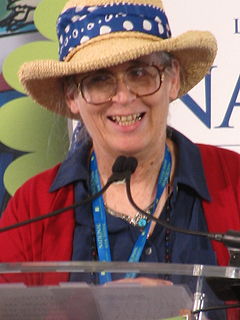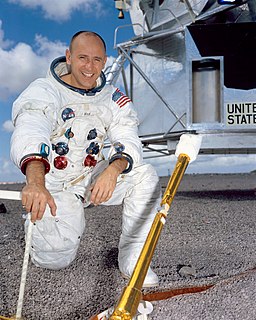A Quote by Gene Cernan
The moon is bland in color. I call it shades of gray. You know, the only color we see is what we bring or the Earth, which is looking down upon us all the time. And to find orange soil on the moon was a surprise.
Related Quotes
There was just one moon. That familiar, yellow, solitary moon. The same moon that silently floated over fields of pampas grass, the moon that rose--a gleaming, round saucer--over the calm surface of lakes, that tranquilly beamed down on the rooftops of fast-asleep houses. The same moon that brought the high tide to shore, that softly shone on the fur of animals and enveloped and protected travelers at night. The moon that, as a crescent, shaved slivers from the soul--or, as a new moon, silently bathed the earth in its own loneliness. THAT moon.
Most eyes have more than one color, but usually they're related. Blue eyes may have two shades of blue, or blue and gray, or blue and green, or even a fleck or two of brown. Most people don't notice that. When I first went to get my state ID card, the form asked for eye color. I tried to write in all the colors in my own eyes, but the space wasnt big enough. They told me to put 'brown'. I put 'brown', but that is not the only color in my eyes. It is just the color that people see because they do not really look atr other people's eyes.
Standing on the Moon looking back at Earth - this lovely place you just came from - you see all the colours, and you know what they represent. Having left the water planet, with all that water brings to Earth in terms of colour and abudance life, the absence of water and atmosphere on the desolate surface of the Moon gives rise to a stark contrast.
I was too tired to think. I merely felt the town as a unique unreality. What was it? I knew -- the moon's picture of a town. These streets with their houses did not exist, they were but a ludicrous projection of the moon's sumptuous personality. This was a city of Pretend, created by the hypnotism of moonnight. -- Yet when I examined the moon she too seemed but a painting of a moon and the sky in which she lived a fragile echo of color. If I blew hard the whole shy mechanism would collapse gently with a neat soundless crash. I must not, or lose all.
It was a murky confusion — here and there blotted with a color like the color of the smoke from damp fuel — of flying clouds tossed up into most remarkable heaps, suggesting greater heights in the clouds than there were depths below them to the bottom of the deepest hollows in the earth, through which the wild moon seemed to plunge headlong, as if, in a dread disturbance of the laws of nature, she had lost her way and were frightened.






























